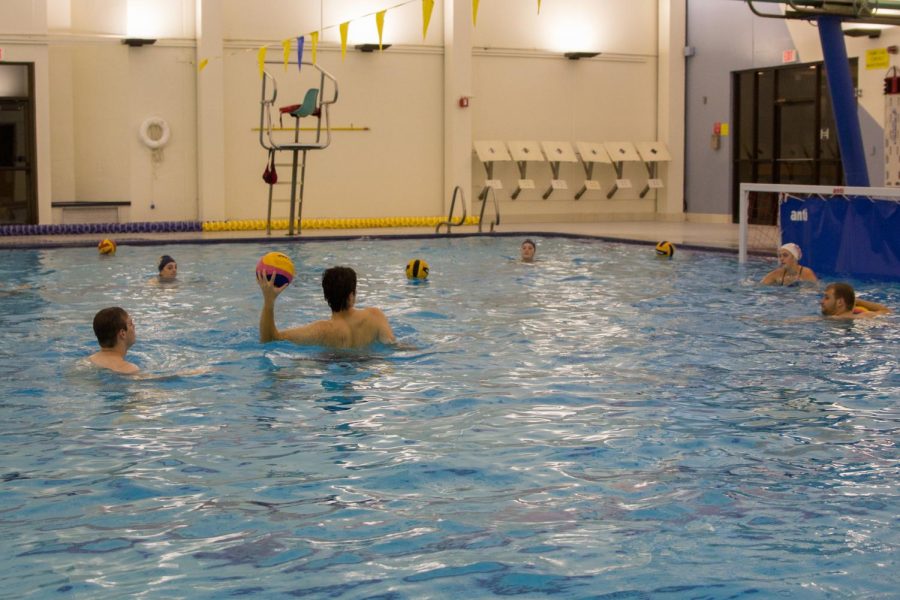Twenty-five yards, eight minutes per quarter. Seven teammates slip into the pool. In the world of water polo, it’s all about the numbers.
Nine feet. That’s the difference in depth between the shallow and deep ends of the pool. That doesn’t cross many of the players’ minds as they enter the Helfaer Tennis Stadium and Recreational Center. It’s how they play the game.
Marquette’s co-ed water polo club has been around for a little over a decade, pulling in anywhere from about 10 to 20 plus students.
“It fluctuates,” Devin Flaherty, club president and junior in the College of Health Sciences, says. “We’ll have more (players) coming into the school year joining, and then come second semester everyone will get busy with sororities and stuff and we’ll lose some of them.”
One thing that doesn’t change is the rules. In regulation play, players must keep their shoulders under the water and refrain from touching the pool floor. At the Rec Center, the deep end sits at 12 feet 6 inches while the shallow end is limited to 3 feet 6 inches. This 9-foot difference is mediated when players switch sides at the half for equal advantage.
Scott Anderegg, assistant director of recreational sports, sees this as one of the club’s challenges. He says the club makes the most of the difference in depth and won’t let it change anything about the game.
“It’s still a great exercise,” Anderegg says. “You’re basically treading water for a long period of time.”
Not only is a great work out, but Anderegg believes water polo as a club on campus is an asset.
“It’s (a) great experience because they’re learning leadership skills, camaraderie and gaining a group of friends that have a common interest,” Anderegg says. “Clubs work better and are more advantageous because they’re getting the life skills with budgeting, fundraising and scheduling.”
The club water polo team certainly learns life skills as they tackle late-night weekday practices, different pool depths, fluctuating participation numbers and co-ed versus all-men teams.
On top of all of these challenges, sharing the pool tends to be a difficult task. Marquette is home to several aquatic activities, including swimming and diving, which forces water polo to practice late at night.
“Our practices are from 8 to 10 at night two times a week,” Flaherty says. “It does stink just because it is late, but it’s also nice that it’s not in the middle of the day, so you can get homework done before.”
“Afterwards we (would) have all the underclassmen take us and swipe us into McCormick for dinner,” Flaherty says. “Hopefully we’ll go to (The Commons) now.”
The atmosphere around the club keeps Flaherty excited to continue her presidency. But planning practices seems to be a persistent issue. Scheduling games, however, is much easier.
Marquette is one of 16 universities to compete in the American Collegiate Water Polo League. Kyle Passini and Mitch Meyer, two Iowa State graduates, run the league, and it has been open to teams for the last three years. Passini and Meyer founded the league because they wanted to help the sport continue across the region.
Leading as commissioners, Passini and Meyer exhaust their time by ensuring teams get plenty of times to play, as well as a cost-efficient way to afford the season.
“Water polo is such a unique sport, so the community of people that are involved with it are second to none,” Passini says. “Over the past 10 years of playing, I have met lifelong friends and have gotten to know many more that I wouldn’t have gotten to otherwise.”
In fall 2015, Marquette placed third in the league. Even though they did not compete last spring (due to lack of members), Marquette club water polo created its own tournaments. One of which was a Wisconsin tournament against University of Wisconsin-Milwaukee, University of Wisconsin-Madison and Hippos, a seniors team in the area.
“I like being in the water. Just the aspect of having to be in the water and having such a difficult sport. A lot of people don’t actually realize how hard it can be. There’s more to it than just swimming and treading. It’s a game and it’s a team thing,” Flaherty says. “We work really well as a team. Just being with the people you’re so close with all the time. It’s not just going to practice or going to play a sport. It’s going to have fun with friends.”

